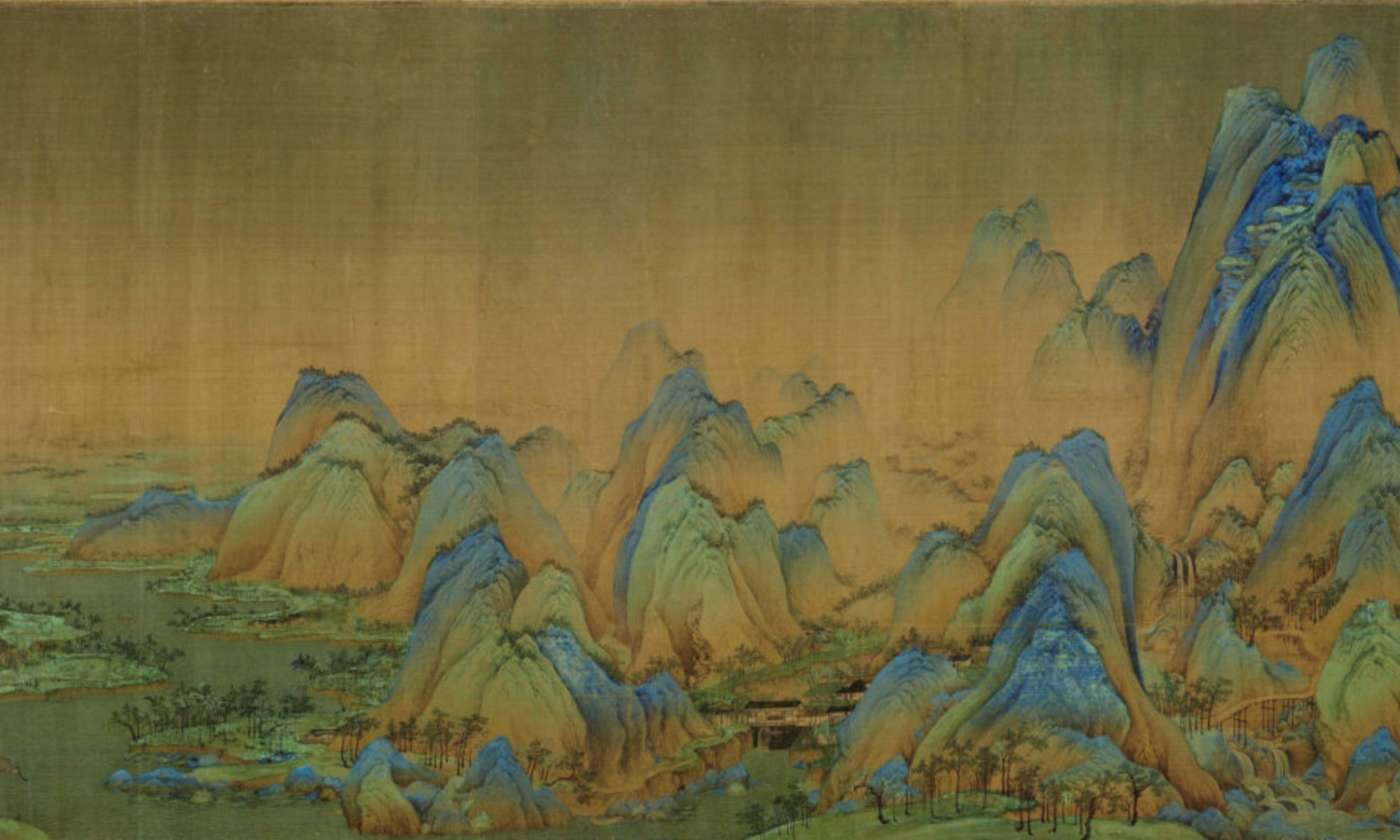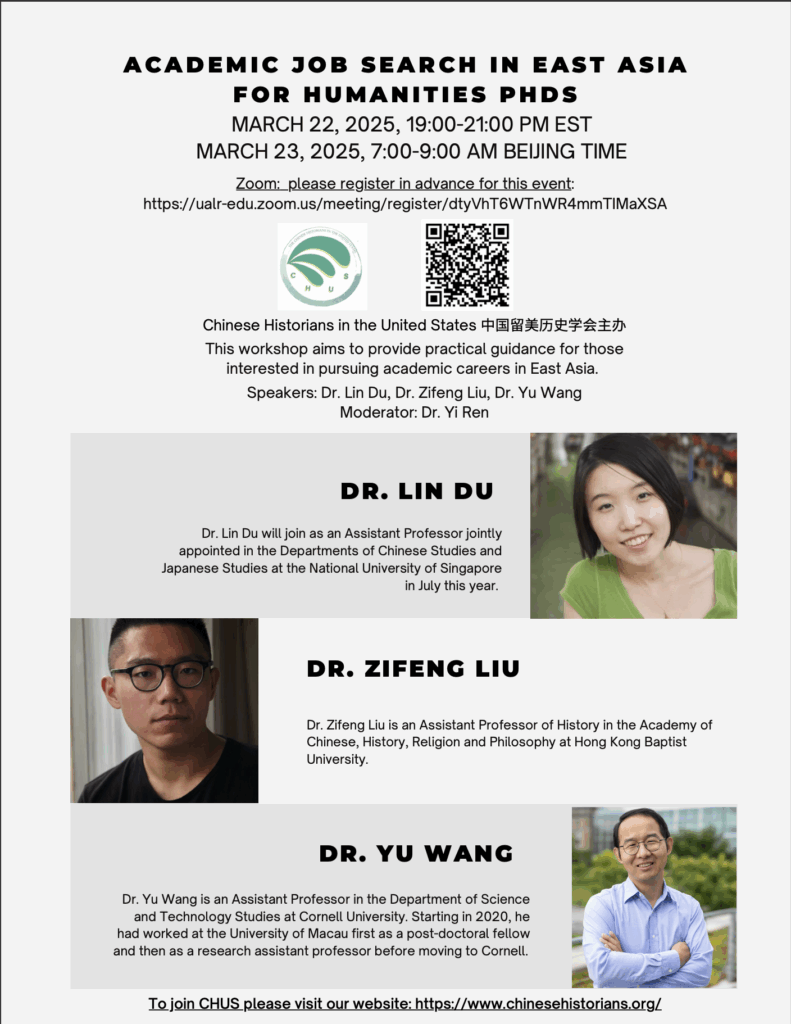Saturday, January 10, 2026: 1:30 PM-3:00 PM
Marshfield Room (Palmer House Hilton, Third Floor)
Session Organizer: Shouyue Zhang, University of Melbourne
Chair: Guoqi Xu, University of Hong Kong
Papers:
Global Connections and Local Realities: Hong Kong Prostitution, 1904–35
Iris Boyun Lei, University of Hong Kong
Transpacific News Reporting: The Chongqing School of Journalism and the Negotiation of Press and Propaganda During Wartime, 1943–45
Di Luo, University of Alabama at Tuscaloosa
The Pan-Pacific Decades: China, Hawaii, and Interwar Pacific Internationalism, 1910s–30s
Bohan Zhang, Rice University
“God Called Me to the Land of My Forefathers”: A Chinese American Teacher in China During the First Half of the 20th Century
Shouyue Zhang, University of Melbourne
Comment: Charlotte Brooks, Graduate Center and Baruch College, City University of New York
Session Abstract:
This panel brings together scholars based from the U.S., Australia, and Hong Kong to explore the multidimensional interactions and exchanges that shaped the Pacific world in the twentieth century. We center on China’s pivotal role in negotiating global and local dynamics. By analyzing cultural, political, and intellectual exchanges across the Pacific, this panel illuminates how the Chinese diaspora engaged with global networks to navigate challenges of imperialism, internationalism, and modernity. The four papers span diverse yet interconnected themes, emphasizing the interplay between global forces and local realities while uncovering underexplored histories of cross-cultural influence and negotiation.
Rethinking the Global China and Chinese diaspora in the Pacific World, four presenters will share their rigorous research on this theme. Iris Lei reviews Hong Kong’s prostitution industry from 1904 to 1935, examining the intersection of gender and colonial modernity by considering its global integration. Dr. Di Luo focuses on the Chongqing School of Journalism during WII, revealing broader tensions between press freedom and wartime propaganda. Bohan Zhang explores Hawaii’s Pan-Pacific movement in China, shedding light on an underexplored cross of Chinese and Pacific history in the Interwar period. Shouyue Zhang studies Chinese Americans in China during the Chinese Exclusion Era, demonstrating that this reverse migration reshaped both their dual identities and the duality of Chinese modernization.
Together, these papers contribute to a broader discussion that redefines China’s global position and cultural identity during a century of transformation. This panel underscores the importance of global-local linkages, transnational mobility, and intellectual exchange in shaping the histories of Asia and America. The panel integrates interdisciplinary perspectives to illuminate how Chinese actors negotiated global crises, adapted international networks, and mediated cultural exchanges, thereby shaping national and transnational identities. By focusing on the circulation of knowledge, mobility, and institutional engagement, this panel repositions China as a central and active participant in the Pacific world, offering new insights into the complexities of global history. By engaging with themes of migration, education, journalism, and internationalism, this panel enriches our understanding of how China navigated and influenced the evolving global order in the twentieth century.
Paper Abstracts
Global Connections and Local Realities: Hong Kong’s Prostitution from 1904to 1935
Iris Boyun Lei, The University of Hong Kong
During Hong Kong’s early colonial period, a severe gender imbalance led to a rapid influx of prostitutes. By the early 20th century, the prostitution industry flourished. Shek Tong Tsui emerged as one of the most renowned red-light districts in the East, attracting prostitutes from Canton, Shanghai, Europe, and Japan. However, by the 1930s, growing feminist activism in Britain and the League of Nations’ global campaign against the “white slave trade” pressured Hong Kong to dismantle its legalized brothel system.
Existing scholarship predominantly examines prostitution through the lens of British colonial regulation, with much of the focus placed on the period before the 20th century. This study, however, shifts attention to the internal dynamics and external influences shaping Chinese prostitution between the 1900s and 1930s, drawing on extensive archival sources—including Po Leung Kuk records, tabloid newspapers, CO129 files, League of Nations reports, government documents, and memoirs.
Rooted in traditional brothel culture, Chinese society cultivated an internal space of romanticized, historically inspired brothels, with sensationalized tales and rigorous Established Customs. In contrast, the British colonial government incorporated Hong Kong’s prostitution industry into the broader regulatory framework of the British Empire, though it later came under increasing pressure from the global anti–white slavery movement. This interplay between internal expansion and external opposition created a paradoxical social landscape between 1900 and the 1930s—while the prostitution industry thrived domestically, international condemnation of the practice intensified. This tension ultimately culminated in 1935, when the Hong Kong government issued an official order to abolish the legalized prostitution system. By adopting a global, social, and spatial history approach, this research situates Hong Kong’s prostitution industry within broader transnational dynamics, offering new insights into the intersection of gender and colonial modernity.
Trans-Pacific News Reporting: The Chongqing School of Journalism and the Negotiation of Press and Propaganda during Wartime (1943-1945)
Di Luo, University of Alabama at Tuscaloosa
In 1943, two former classmates, Hollington Tong (1887–1971), China’s Vice- Minister of Publicity, and Carl A. Ackerman, Dean of the Pulitzer School of Journalism at Columbia University, collaborated to establish a wartime post- graduate school of journalism in Chongqing, China. Staffed by Columbia faculty and funded by the Chinese Nationalist government, this school aimed at training top-tier professional international news reporters for China. During its two years of operation, the school graduated two classes comprising fifty-seven students, many of whom went on playing vital roles in journalism, diplomacy, and education in post-war China and the United States.
While scholars have examined the Chinese Nationalist government’s efforts in international propaganda during the early years of World War II, the role of the wartime journalism school in Chongqing (1943–1945) remains largely understudied. This paper investigates the founding and operations of this school through archival materials, student-run newspapers, and private correspondence between Columbia faculty and their families. By analyzing the negotiation between professional journalism ideals, free press, and the state’s control of information during wartime, this study sheds light on the broader tensions between press freedom and propaganda. It highlights the critical role of trans-Pacific collaboration in shaping journalistic practices and underscores the ongoing relevance of understanding how access to and control over information are contested in moments of crisis.
The Pan-Pacific Decades: China, Hawaii, and the Interwar Pacific Internationalism, 1910s to 1930s
Bohan Zhang, Rice University
Recent scholarship on Pacific internationalism and Pan-Asianism in the twentieth century has predominantly focused on Japan and the Philippines, often overlooking China’s role. This research addresses that gap by examining the activities of Chinese migrants, diplomats, and athletes within the Pan-Pacific movement during the early twentieth century. It explores how these individuals strove for, questioned, or resisted unity across the Pacific Rim amid imperialism and political instability in China. A notable example is the 1931 Institute of Pacific Relations (IPR) Third Pan-Pacific Conference in Shanghai, marking the peak of Chinese public participation in trans-Pacific initiatives. Chinese scholars, characterized by their modern disciplinary expertise and national diplomacy efforts, were key participants in the Pan-Pacific organizations founded under the Wilsonian ideals in Hawai‘i. Additionally, this research focuses on the resistance to Wilsonian Pan- Pacific internationalism within China. Led by the Research Association for Oriental Issues in Beijing and supported by several regional Kuomintang branches, anti-IPR movements gathered Chinese journalists and party officials who opposed the Pan-Pacific agenda promoted by scholarly elites. Their opposition reveals the growing divide between nationalist perspectives and academic-driven internationalism. By focusing on Pan-Pacific organizations founded in Hawaii (Pan Pacific Union and Institute of Pacific Relations), this research sheds light on an underexplored aspect of Chinese and Pacific history in the Interwar period from the late 1910s to 1930s.
“God Called Me to the Land of My Forefathers”: A Chinese American Teacher in China During the First Half of the 20th Century
Shouyue Zhang, University of Melbourne
From 1912 to 1949, many educated American-born Chinese returned to their ancestors’ motherland. Their American educational background enabled them to serve in Chinese secondary and tertiary schools. They were motivated by several factors, like Chinese exclusion in North America and Christian missionary spirits. Joining the inquiries of Jennifer Bond, Charlotte Brooks, and Daniel H. Bays, I will re-examine the experiences and legacy of American teachers with Chinese ancestry in Republican China. Using family papers, oral sources, and university archives collected in the United States and China, I tentatively argue that Chinese American teachers contributed to the intellectual exchanges between America and China. Their worldviews differed from either returned Chinese international students or white American teachers in China. Transnational mobility reshaped returned Chinese Americans’ multiple national identities. Their home-returning routes inspired by the republican government’s propaganda shaped Chinese modernization narratives with a stigma of racial discrimination overseas. Racial discrimination and foreign invasion co-constructed the duality of Chinese modernization.


